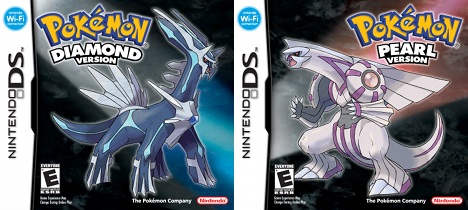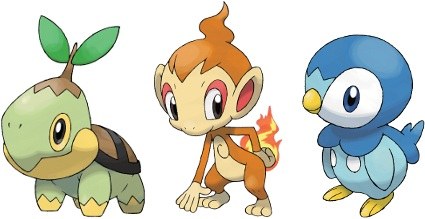Pokemon Diamond & Pearl

Pokemon moves into its fourth generation with Pokemon Diamond & Pokemon Pearl and brings with it some major changes to the gameplay, in particular the battle system.
Release dates
| Japan | September 28, 2006 |
|---|---|
| America | April 22, 2007 |
| Europe | July 27, 2007 |
Gameplay
The story takes place in the mountainous region of Sinnoh. In your home town of Twinleaf, your friend encourages you to go looking for Pokemon. When running into trouble, the two of you take a Pokemon from an abandoned briefcase. It turns out to belong to Professor Rowan of Sandgem Town. After returning the case you get to keep the Pokemon and begin your adventure exploring Sinnoh!Along the way you run into many trainers and wild Pokemon as usual. An evil group called Team Galactic get in your way, and try to take over the world by harnessing the power of legendary Pokemon.
New battle mechanics
Diamond/Pearl overhauls the battle mechanics and ushers in a new style of competitive gameplay. In previous games, moves of certain types were always physical or special. Now, each attack is individually categorized as Physical (using the Attack stat) or Special (using the Special Attack stat). A third category, Status, covers non-attacking moves such as those raising or lowering stats.The three move categories: Physical, Special, Status.
In many cases however, several types still lean towards Physical or Special. Fighting moves, for example, are mostly physical, while Psychic moves are still mostly special.
The Pokédex
Unlike the preceding Ruby/Sapphire, the local Pokedex in Diamond/Pearl features a mix of new Pokemon and older Pokemon like Abra, Zubat and Geodude. There are also many new evolutions for previous Pokemon such as Rhyperior, Electivire, Magmortar and Mamoswine to name a few.Once you have beaten the Elite Four and seen every Pokemon in the Sinnoh Pokedex, you receive the national dex, which lists all 493 Pokemon in their original order.
Diamond/Pearl also introduces the most legendary Pokemon of any generation, with 14 mythical creatures.
PokéRadar
After obtaining the national dex, Pokemon from other regions are imported into Sinnoh. You also receive a key item called the PokéRadar, which allows you to search out rare Pokemon in grass. Using the PokéRadar makes several grass patches shake around you, each indicating a Pokemon is hiding there. Some of them will be a Pokemon from a different region.Some Pokemon can also be caught in the wild when a Generation III game is inserted into the GBA slot on the Nintendo DS.
Pal Park
It is not possible to trade Pokemon with earlier games, however, Diamond/Pearl allows the migration of Pokemon from any Generation III game, by inserting the cartridge into the GBA slot on the DS and selecting the appropriate option on the startup screen (after the National Dex has been obtained).Furthermore, a special area called Pal Park is opened up, where you can catch the Pokemon you migrate in a sort of mini-game. Pal Park has five areas; each species of Pokemon will always reside in a particular area.
Other features
The day & night system makes a major return, with more time- and day-based events such as new Pokemon evolutions.The Sinnoh Underground, where you can dig up treasures, Pokemon fossils and other items. It also takes advantage of the DS' infrared connectivity.
A gadget called the Pokemon Watch, or Pokétch is the Diamond/Pearl equivalent of the PokéGear or PokéNav from other games. It utilizes the touch screen and has many apps (25 in total) including a clock, Dowsing Machine (item finder), calculator, step counter.
The wi-fi connectivity feature of the Nintendo DS is taken advantage of, with the Global Trade Station allowing for Pokemon trades over the Internet.
A new type of contests, called Super Contests, are introduced. There are three sections: dressing up a Pokemon with accessories; mimicing and creating dance routines; and performing their battle moves in front of judges.

No comments:
Post a Comment